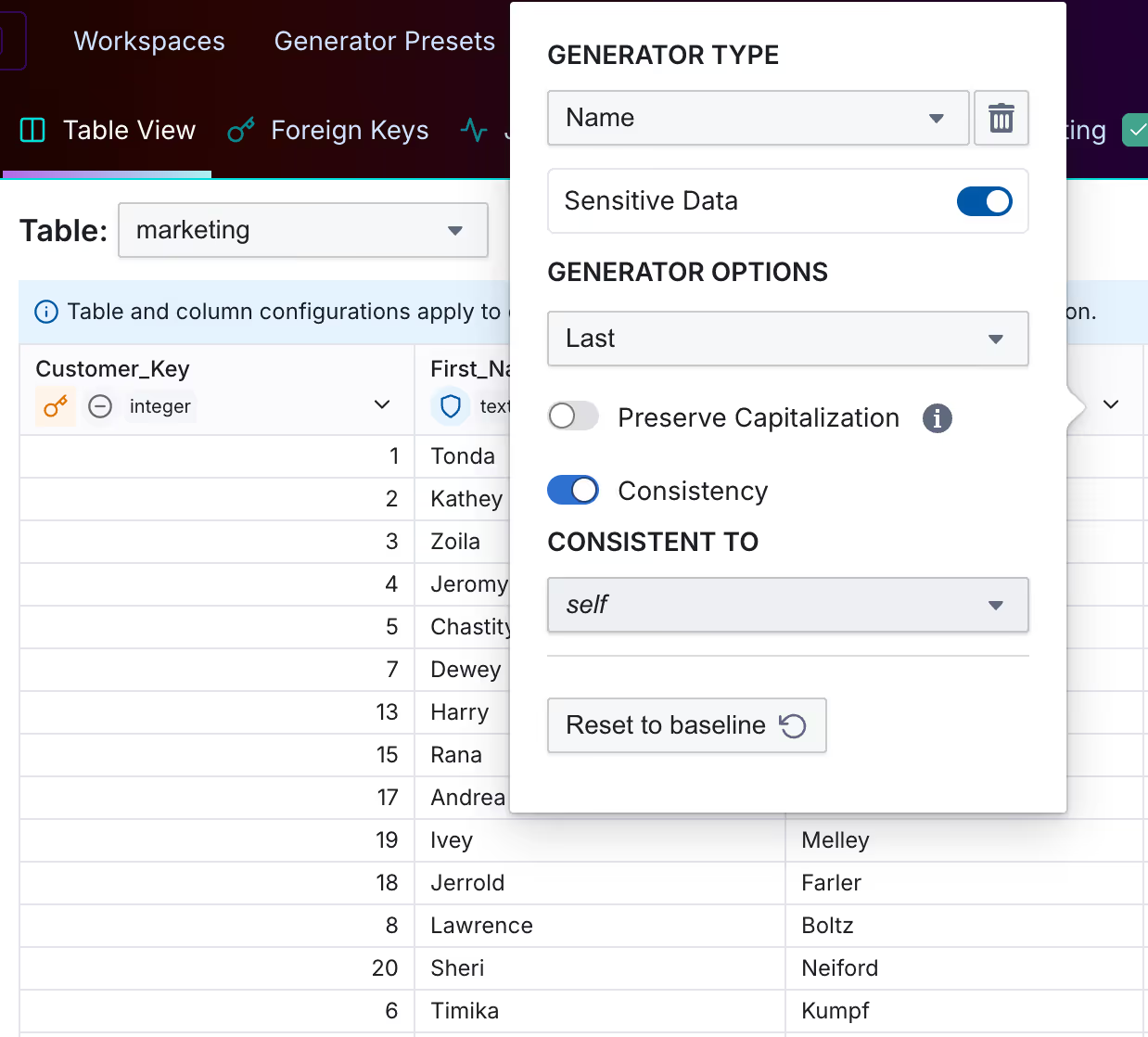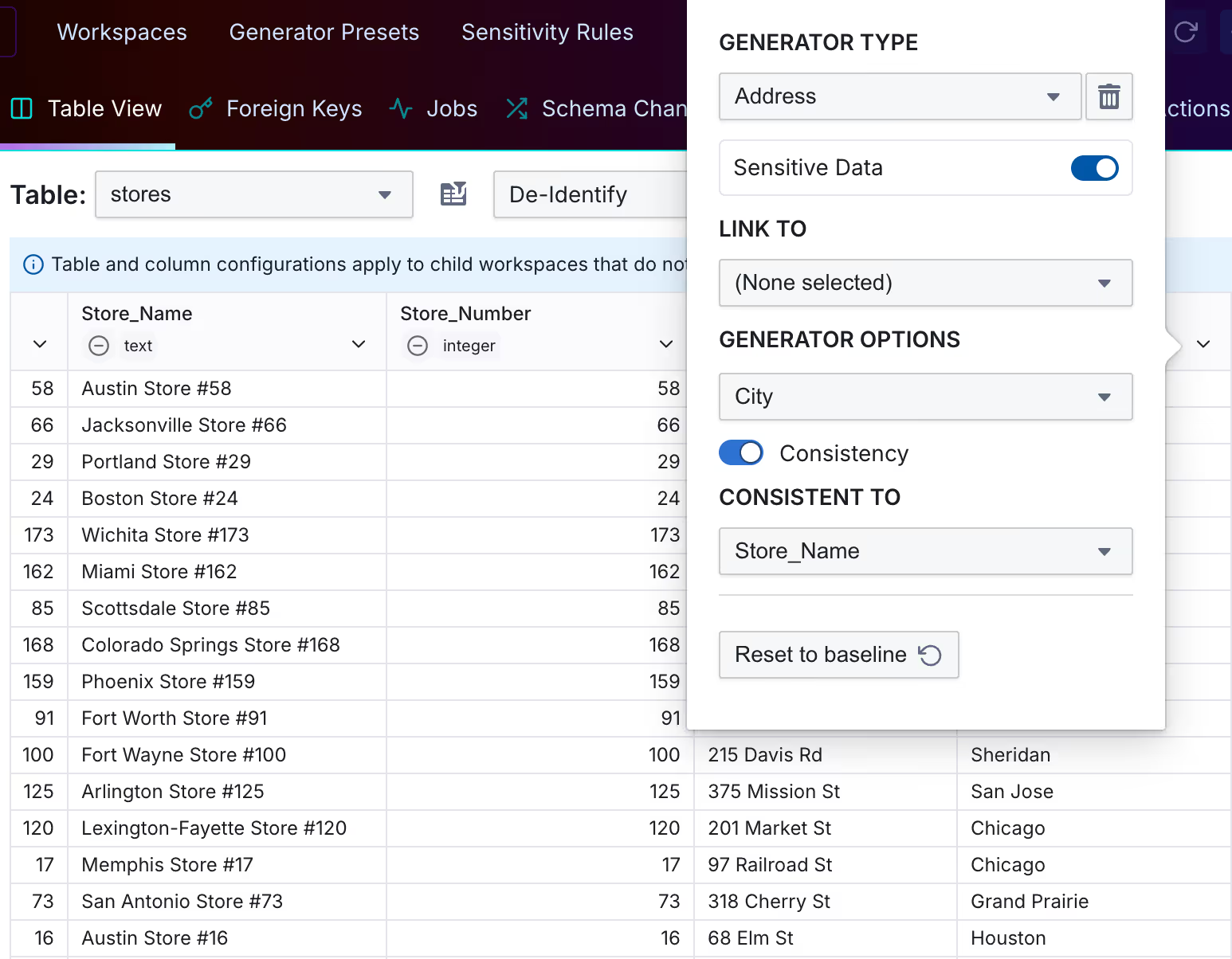Deterministic masking: what it is and why it matters
Data masking is a foundational tool for protecting sensitive information in non-production environments. But not all masking methods are created equal. When consistency is critical across systems, across time, or across use cases, deterministic masking stands out as a powerful, precise solution.
In this post, we’ll unpack what deterministic masking is, how it works, and why leading data teams turn to Tonic.ai’s test data management platform Tonic Structural to implement it at scale. Along the way, we’ll explore how deterministic masking supports data utility, regulatory compliance, and cross-database consistency, all without compromising privacy.
For a broader look at data masking techniques and use cases, check out our guide to data masking.
What is deterministic masking?
Deterministic masking is a technique that ensures the same input value always produces the same masked output. For example, if “Jane Smith” appears in a dataset multiple times, a deterministic masking algorithm will always transform it into the same replacement value (e.g., “Alice Brown") every time it appears, across every table or system.
This is especially useful when preserving data relationships or referential integrity is essential. Take a customer ID, for instance. If that ID shows up in both a transactions table and a support ticketing system, deterministic masking ensures it’s consistently masked—enabling downstream processes like analytics or testing to remain functional and realistic.
Unlike dynamic masking, which hides data on-the-fly at the presentation layer, deterministic masking modifies data at rest. That means the masked data can be moved across environments while retaining its utility, ideal for staging, testing, and analytics.
Tonic Structural, our industry-leading test data management platform, enables deterministic masking to be applied intelligently and consistently at scale—even when working with highly complex or distributed datasets.
Why deterministic masking is important
Deterministic masking plays a key role in helping organizations balance data utility with data protection. Here’s why it matters:
- Data privacy
Deterministic masking removes direct identifiers and replaces them with consistent surrogates, reducing the risk of exposing sensitive information in test and dev environments. - Data utility and realism
Because masked values retain consistency, the resulting datasets preserve the structure and logic of the original data—crucial for accurate testing, QA, and analytics. - Data quality
Maintaining consistency in how values are masked reduces mismatches, nulls, and other data integrity issues that can break test environments or mislead analysts. - Consistency across databases and systems
Deterministic masking ensures that values are transformed identically across different systems and environments—enabling realistic, cross-system workflows. Tonic Structural makes it easy to maintain this consistency automatically, even as your environments evolve.
How deterministic masking works
Tonic Structural’s deterministic masking capabilities make it easy to preserve consistency across your synthetic datasets. Here’s how it works:
Self-consistency
A single value in a column will always be replaced with the same masked value—no matter where or how often it appears in that column. Additionally, if you make the same generator self-consistent for different columns of the same data type, then the same source values in those columns will always produce the same output values in a given dataset. This ensures referential integrity within a table.

Consistency with another column
Need two columns to remain logically connected—like first and last names, or user ID and email? Tonic Structural allows you to link generators so values stay consistently paired across columns. It handles these linkages with minimal configuration, keeping your data realistic.

Consistency across data generation runs
Masking should be repeatable. Structural enables deterministic consistency across multiple runs, so you can regenerate data with confidence that values will stay stable.
Consistency across multiple databases
Testing or staging environments often span multiple databases. By setting a statistics seed within Structural, deterministic values are synchronized across all environments, ensuring data flows and relationships stay intact—no manual mapping required. Alternatively, Structural also offers the option of overriding the statistics seed to tailor consistency to the specific needs of individual workspaces or use cases.

Accelerate your release cycles with realistic, compliant data de-identification today.
Benefits of deterministic masking
At a glance, here are the major benefits of deterministic masking:
- Data integrity: Keeps data relationships intact, preserving usability across linked tables and systems.
- Consistent masking: Every instance of a value is masked the same way, no matter where it appears.
- Efficiency and utility: Reduces friction in test environments by preserving logic and structure.
- Regulatory compliance: Helps meet GDPR, HIPAA, and other privacy requirements while retaining useful data.
- Supports complex use cases: Enables cross-database consistency, iterative test generation, and realistic test automation workflows. Tonic Structural brings all of these capabilities into a unified, low-maintenance platform.
Other masking techniques
Deterministic masking is just one part of a robust data synthesis strategy. Tonic Structural offers a number of additional approaches tailored to specific data needs. These methods help you address a range of privacy, compliance, and utility concerns depending on your data type, user base, and test goals.
Linking generators
Linking generators is essential when two or more fields have an intrinsic relationship. For example, if your dataset includes a username and an associated email address, Tonic lets you link these fields so they remain logically matched across masked output. This feature maintains semantic integrity without compromising privacy, and is especially useful in datasets that drive realistic QA scenarios or user workflows.
Differential privacy
Ideal when you need strong statistical privacy guarantees. A number of our generators allow you to apply differential privacy to the data generation process, which introduces mathematical noise to better protect outliers in a dataset and reduce the risk of reidentification. It’s a particularly powerful tool for organizations sharing statistical or aggregate data externally, ensuring insights can be used without leaking sensitive details.
Format-preserving encryption (FPE)
Format-preserving encryption allows you to encrypt values while retaining their original format. This is especially useful for fields like credit card numbers, national IDs, or phone numbers where structure matters. FPE is ideal when downstream systems require a specific format to function, but the underlying values still need to be protected.
Try Tonic Structural for deterministic masking
Deterministic masking is essential when you need test data that’s both private and useful. Tonic Structural makes it easy to apply deterministic techniques across systems, columns, and generations. The platform ensures your data is protected without losing its structure, realism, or integrity.
With Structural, you can build and maintain deterministic masking workflows at enterprise scale—no matter how many databases, teams, or test environments you support.
Want to see deterministic masking in action? Connect with our team to explore how Structural fits into your data privacy and testing workflows.
Unlike non-deterministic masking, deterministic masking always produces the same output for the same input, making it ideal for preserving relationships and testing scenarios across datasets.
Yes. With advanced features like generator linking and cross-database consistency, as well as generators for complex data types including Regex and JSON, Tonic Structural generates realistic, referentially intact datasets that reflect the structure of your original data. The platform automates these relationships with minimal setup.
You'll want to account for data dependencies, format preservation, and repeatability. Platforms like Tonic Structural simplify these factors by giving you granular control over consistency at every level through an intuitive UI.
.svg)
.svg)




























